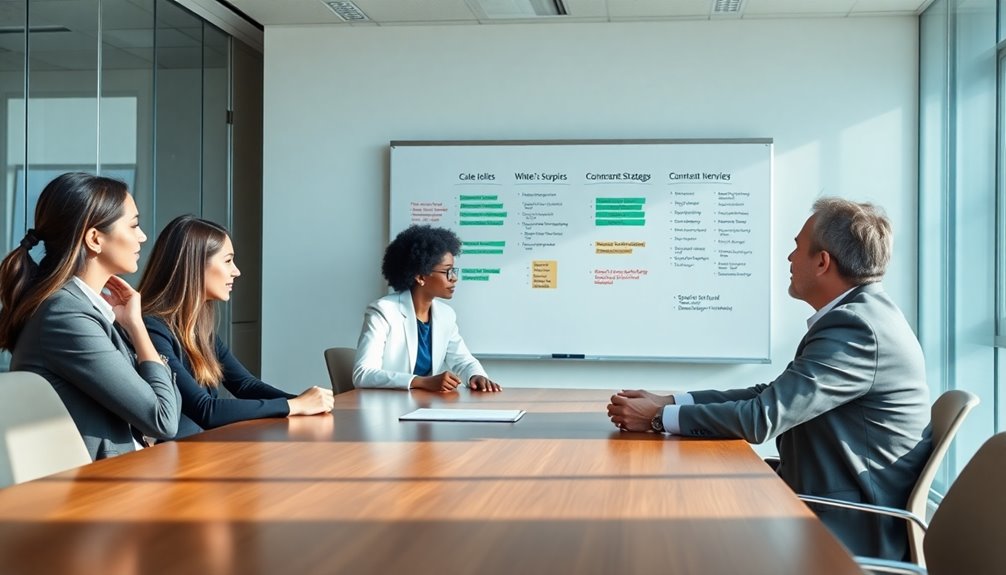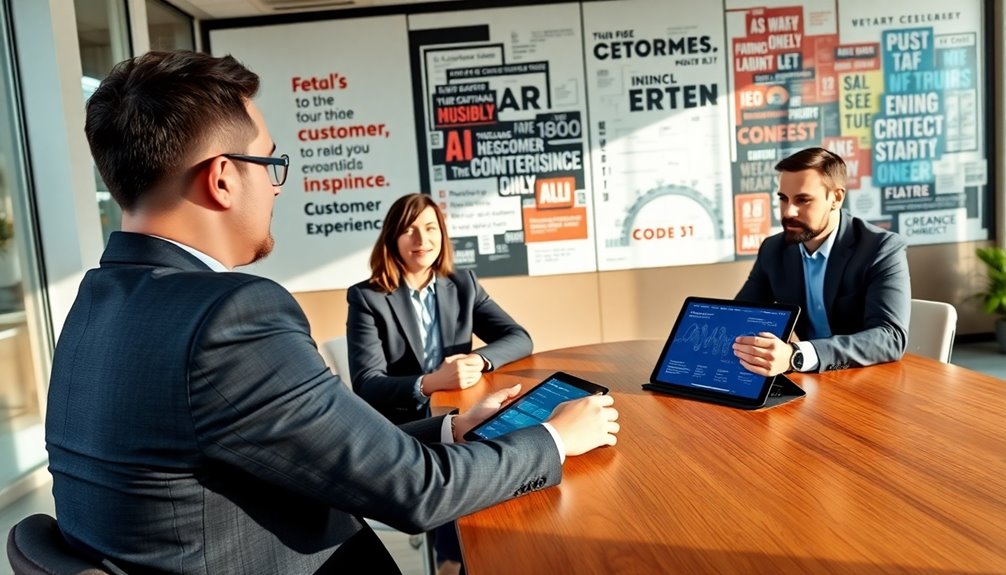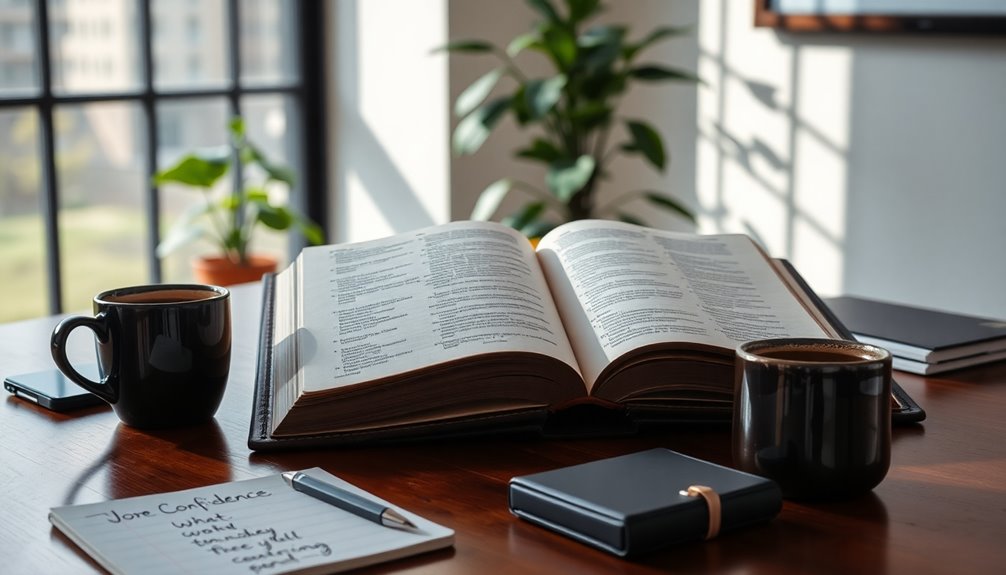Unpacking the interviewer-interviewee dynamic is essential for your interview success. You need to showcase your skills while aligning your values with the company's mission. Prepare for common questions and practice concise, direct responses. Managing stress through techniques like deep breathing can help you present confidently. Remember, both you and the interviewer play distinct roles; you're highlighting your strengths, while they're evaluating your fit for the position. Active listening and adapting your communication style can enhance rapport. By understanding these dynamics, you can navigate the interview process more effectively and set yourself up for success in the future.
Key Takeaways
- The interviewer's role is to assess candidates' fit through structured questions aligned with organizational goals and values.
- The interviewee must effectively showcase relevant skills and experiences while articulating personal strengths.
- Active listening from both parties fosters respect and improves the quality of the dialogue during the interview.
- Positive body language and confidence from the interviewee can enhance rapport and impact the interview's outcome.
- Follow-up communication reinforces the interviewee's interest and professionalism, contributing to a positive lasting impression.
Key Interview Questions

When preparing for an interview, you'll encounter key questions that can greatly impact your chances of landing the job. Interviewers often ask, "Why you?" to gauge your unique fit for the role.
You'll also face inquiries like, "Why this job?" and "Why this organization?" which require you to connect your values and goals with the company's mission.
Don't forget to address questions about your career industry and any potential challenges, such as handling stress or explaining career breaks.
To ace these questions, prepare concise and direct responses. Research the company and rehearse with mock interviews to build confidence.
Finally, remember that interviews are your chance to showcase your suitability, so make every answer count!
Managing Stress Effectively
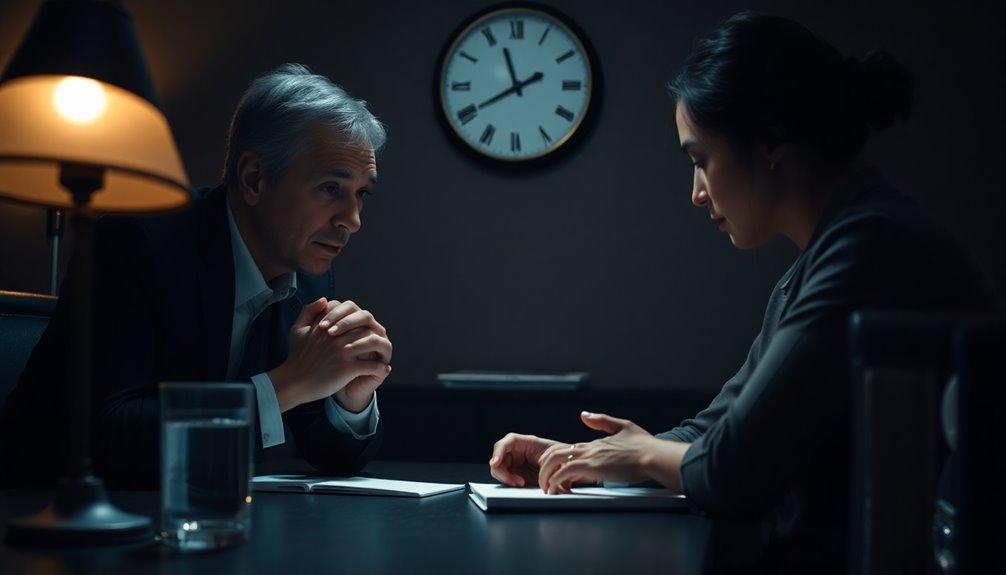
Although interviews can be nerve-wracking, managing stress effectively is essential for presenting yourself confidently. To handle anxiety, start with simple techniques that ground you.
Consider practicing deep breathing before your interview. Visualizing a successful outcome can also boost your confidence. Remember, it's all about framing stress positively.
- Use positive body language: smile and maintain eye contact.
- Prioritize your responses: tackle difficult questions first during preparation.
- Reflect on past experiences: focus on what you learned from challenges.
Roles in the Interview Process

Managing stress during an interview not only helps you present yourself confidently but also sets the stage for understanding the distinct roles each participant plays in the process.
As an interviewee, you're tasked with showcasing your skills and experiences to demonstrate your fit for the role. You need to highlight your strengths and articulate why you're the ideal candidate.
On the other hand, the interviewer represents the employer, aiming to identify the best candidates through structured questions. They assess your responses, evaluate your suitability, and decide if you align with the organization's goals. Recognizing these roles can enhance your performance, allowing you to engage more effectively and create a positive impression during the interview.
Additionally, demonstrating strong communication skills can significantly enhance your rapport with the interviewer, making your responses more impactful.
Follow-Up Etiquette
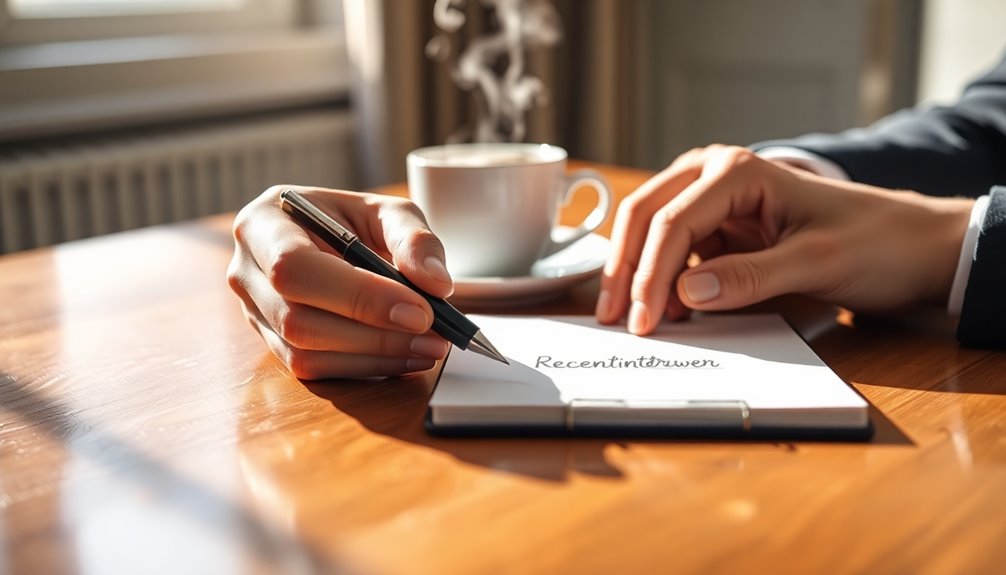
Following up after an interview is essential for reinforcing your interest and leaving a lasting impression on the interviewer. A well-timed thank-you note can set you apart from other candidates and demonstrates your professionalism.
Keep it concise and express gratitude for the opportunity to interview.
- Send your follow-up within 24 hours to show promptness.
- Personalize your message by referencing specific topics discussed during the interview.
- Use a professional tone, and proofread for any errors before hitting send.
Strategies for Successful Interaction

Successful interaction during an interview hinges on your ability to connect with the interviewer. Start by actively listening to their questions; this shows respect and improves dialogue.
Be prepared to share your experiences concisely while highlighting your fit for the role. Use open-ended questions to engage the interviewer and create a two-way conversation.
Don't shy away from pauses; they can offer you time to think and demonstrate confidence. Maintain a friendly tone, and remember that both of you're trying to find the right match.
Ultimately, adapt your communication style to mirror theirs subtly, which can foster rapport. By employing these strategies, you'll enhance the overall interaction and leave a positive impression.
Body Language Insights
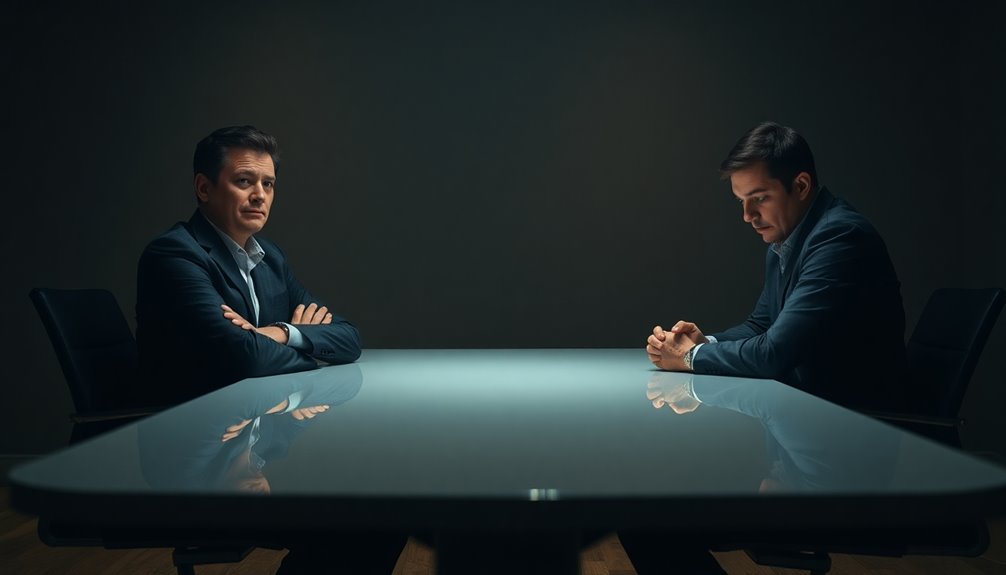
Mastering body language can greatly enhance your interview performance and strengthen the connection with your interviewer. Your nonverbal cues can convey confidence and engagement, making a lasting impression.
Pay attention to your posture, gestures, and facial expressions during the interaction.
- Maintain eye contact to show interest and build rapport.
- Use open gestures, like uncrossed arms, to appear approachable and confident.
- Smile genuinely to create a welcoming atmosphere and reflect enthusiasm for the opportunity.
The Importance of Silence

Silence can be a powerful tool in interviews, offering moments for reflection and deeper thought. Embracing pauses allows you to process questions fully and craft thoughtful responses.
When you take a brief moment to gather your thoughts, it shows confidence and poise, which interviewers appreciate. It's essential not to rush to fill any silence; instead, give yourself permission to think. This practice can reduce pressure and lead to more meaningful exchanges.
Likewise, when you encounter a complex question, a moment of silence can help you articulate your answer more clearly.
Ultimately, recognizing and valuing silence in interviews enhances communication and fosters a more engaging dialogue between you and the interviewer. Additionally, curiosity can enhance your ability to respond thoughtfully by encouraging you to explore different angles of a question.
Frequently Asked Questions
What Should I Bring to the Interview?
When you're heading to an interview, you should bring several key items.
First, have multiple copies of your resume to share with interviewers.
Don't forget a notepad and pen for taking notes or jotting down questions.
If you have a portfolio or examples of your work, bring those too.
Finally, make certain you've got a list of references handy.
Being well-prepared shows your professionalism and enthusiasm for the position.
How Early Should I Arrive for the Interview?
Imagine walking into a room where opportunity awaits, and you've arrived just in time to seize it.
You should aim to arrive 10 to 15 minutes early for your interview. This window gives you time to collect your thoughts and acclimate to the environment.
Being punctual shows your respect for the interviewer's time and sets a positive tone for the conversation ahead. Plus, it allows you to project calm confidence right from the start.
Can I Ask Questions During the Interview?
Absolutely, you can ask questions during the interview! In fact, it shows your interest and engagement.
Prepare thoughtful questions about the role, team dynamics, or company culture. This not only helps you gather important information but also gives you a chance to demonstrate your enthusiasm.
Just make sure to wait for appropriate moments, like when the interviewer invites questions, to keep the conversation flowing smoothly.
It's a great way to connect!
What Should I Do if I Feel Nervous?
If you feel nervous before an interview, take a moment to breathe deeply and focus on calming your mind.
Visualize a successful interaction and remind yourself of your preparation.
Practicing positive body language, like smiling and maintaining eye contact, can boost your confidence.
It's normal to feel anxious, but channel that energy into enthusiasm for the opportunity.
How Should I Dress for the Interview?
Dressing for an interview is like painting your first masterpiece; every detail matters. You should wear professional attire that reflects the company culture while making you feel confident.
Opt for tailored clothes in neutral colors, steering clear of overly casual or flashy styles. Pay attention to grooming and accessories, ensuring they complement rather than distract.
Conclusion
As you prepare for your next interview, remember that effective communication and understanding the interviewer's perspective are essential. Did you know that 70% of employers say they've rejected candidates due to poor body language? By mastering your responses, managing stress, and maintaining positive body language, you can greatly increase your chances of making a lasting impression. Embrace the dynamic of the interview, and you'll be well on your way to landing that dream job!
Eugene brings a fresh, dynamic voice to our platform as one of our talented Writers. Specializing in research-driven content, he explores the latest findings in psychology and personal growth, translating them into actionable insights for our readers. Eugene’s work is fueled by a curiosity about what makes us tick and a desire to help others unlock their potential.

